Finding the perfect wedding venue is like finding a hidden gem; it sets the stage for your wedding day and shapes the entire experience. Your choice of venue is more than just a location; it’s the backdrop for the day, a reflection of your style, and a space that will hold your celebration. Whether you are planning a wedding ceremony and reception at the same or different locations, selecting the best venue for your needs is a key decision in the wedding planning process.
But with so many options and details to consider, how do you ensure that your chosen venue ticks all the right boxes? Whether you dream of a fairy-tale castle, a serene beachfront, or a chic urban loft, this guide will walk you through the top 10 essential things to consider when selecting your ideal wedding venue. From understanding the nuances of budgeting to aligning your venue with your wedding theme, we’re here to help you navigate this exciting journey towards your big day.
📌 Save This For Later ↓
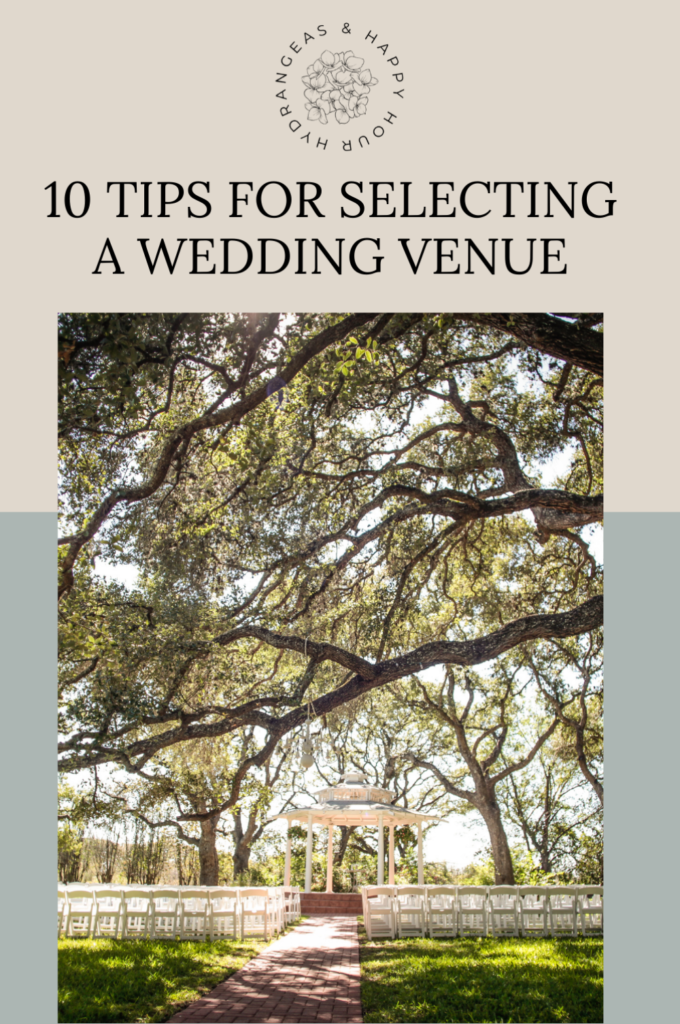
Budget: Choosing a Wedding Venue within Wedding Budget
Assessing Wedding Venue Costs Within Your Budget
A critical step in selecting your wedding venue is ensuring that its cost aligns with your budget. Your venue is likely to be one of the most significant expenses of your wedding day, so it’s important to choose a place that offers what you need without straining your finances.
- Initial Cost Evaluation: Start by getting a clear picture of the venue’s base price. This is typically influenced by factors like location, capacity, and popularity. Ensure that this base cost fits comfortably within your overall wedding budget.
Understanding Hidden Costs
- Additional Expenses: Look beyond the base price. Inquire about extra charges that might not be immediately apparent. These can include corkage fees, overtime charges, setup and cleanup fees, and security costs. Understanding these potential extras upfront can prevent unpleasant surprises later on.
What’s Included in the Wedding Venue Package
- All-Inclusive Venues: Some venues offer all-inclusive packages, which can include tables, chairs, tents, lighting, and even catering services. While these might appear more expensive at first glance, they can offer value and convenience by bundling multiple services.
- Non-Inclusive Venues: Other venues might offer only the space, leaving you to source and pay for other necessities separately. This could mean additional rental costs for furniture, equipment, and decorations.
Making an Informed Decision
When evaluating venues, ask for a detailed breakdown of what is included in their pricing. Compare this with the requirements and expenses of arranging these elements independently. Remember, a venue that seems like a bargain at first might end up being more costly once all external factors are accounted for.
In conclusion, a clear understanding of the total cost – both apparent and hidden – of a venue is essential. This ensures that the venue you choose not only aligns with your vision but also sits comfortably within your financial parameters, making your wedding day both memorable and financially manageable.
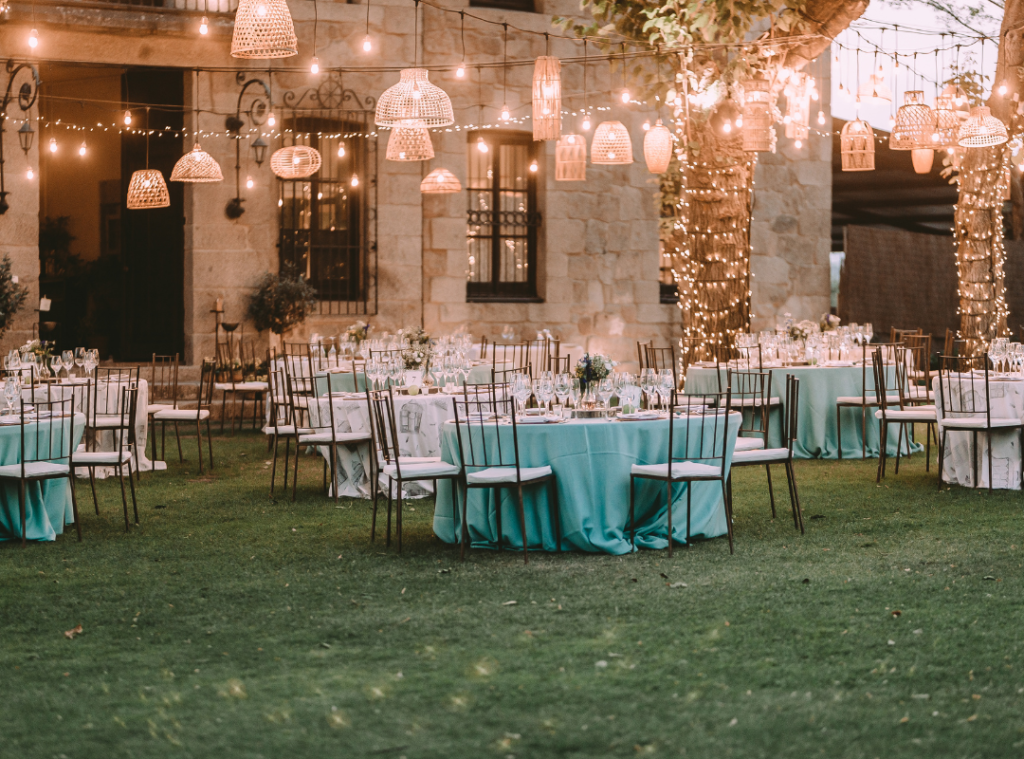
Date and Availability: Aligning Your Timeline with Wedding Venue Options
Securing Your Preferred Date
One of the first steps in the venue selection process is confirming the availability of your desired wedding date. Popular venues often book up far in advance, especially during peak wedding seasons.
- Checking Availability Early: As soon as you have a preferred date or dates in mind, reach out to potential venues to inquire about their availability. This step should be done before getting too attached to any particular location, as your favorite venue might already be booked.
- Flexibility with Dates: If you have some flexibility with your wedding date, communicate this to the venue. They may have openings on other dates close to your preferred time, offering you more options.
Considering an Off-Season Wedding
- Benefits of Off-Peak Seasons: Marrying in the off-season can present several advantages. Venues often have more dates available and may offer reduced rates during these times. This can be particularly beneficial if you’re working with a tighter budget or if you prefer a shorter engagement period.
- Exploring Cost Savings: Off-season weddings can also mean lower costs for other wedding-related services like catering, photography, and accommodation for your guests. Suppliers and vendors are typically less busy during these times and may offer competitive pricing.
Making an Informed Choice
Selecting a wedding date is more than just a mark on the calendar; it’s about aligning your vision with the practical aspects of venue availability. By being proactive about date inquiries and open to the possibilities of an off-season wedding, you can secure a venue that fits your schedule, meets your expectations, and potentially saves on costs.
In summary, prioritizing date availability in your venue search and considering the unique advantages of off-season weddings are key steps in planning your wedding day efficiently and economically.
Style and Theme of the Wedding
When planning your wedding, one of the key decisions is choosing a venue that complements the overall theme and style you have in mind. Whether you’re envisioning a rustic charm, modern elegance, or traditional grandeur, the venue plays a crucial role in bringing your wedding day vision to life.
Matching the Wedding Venue with Your Theme
- Rustic Theme: For a rustic-themed wedding, look for venues with natural elements like barns, farms, or vineyards. These settings typically offer wooden structures, exposed beams, and rural landscapes, ideal for creating a cozy and intimate atmosphere.
- Modern Theme: If you prefer a modern theme, consider venues with clean lines, architectural details, and contemporary spaces. Art galleries, lofts, and minimalist hotels can offer the sleek and sophisticated backdrop you desire.
- Traditional Theme: For those leaning towards a traditional style, historic mansions, grand ballrooms, and stately homes provide a sense of timeless elegance. These venues often feature classic architecture, crystal chandeliers, and ornate decor.
The Wedding Venue’s Contribution to Atmosphere and Aesthetics
The venue sets the tone for the entire wedding and is instrumental in creating the desired atmosphere. It’s not just a physical space; it’s a canvas where your theme comes to life. The architecture, color scheme, lighting, and layout all contribute to the overall aesthetic. A well-chosen venue will not only resonate with your theme but will also require less decoration, as its inherent beauty and style will already align with your vision.
Selecting a venue that fits seamlessly with your desired style and theme is more than a practical decision; it’s about creating a cohesive and harmonious experience for you and your guests on your wedding day.
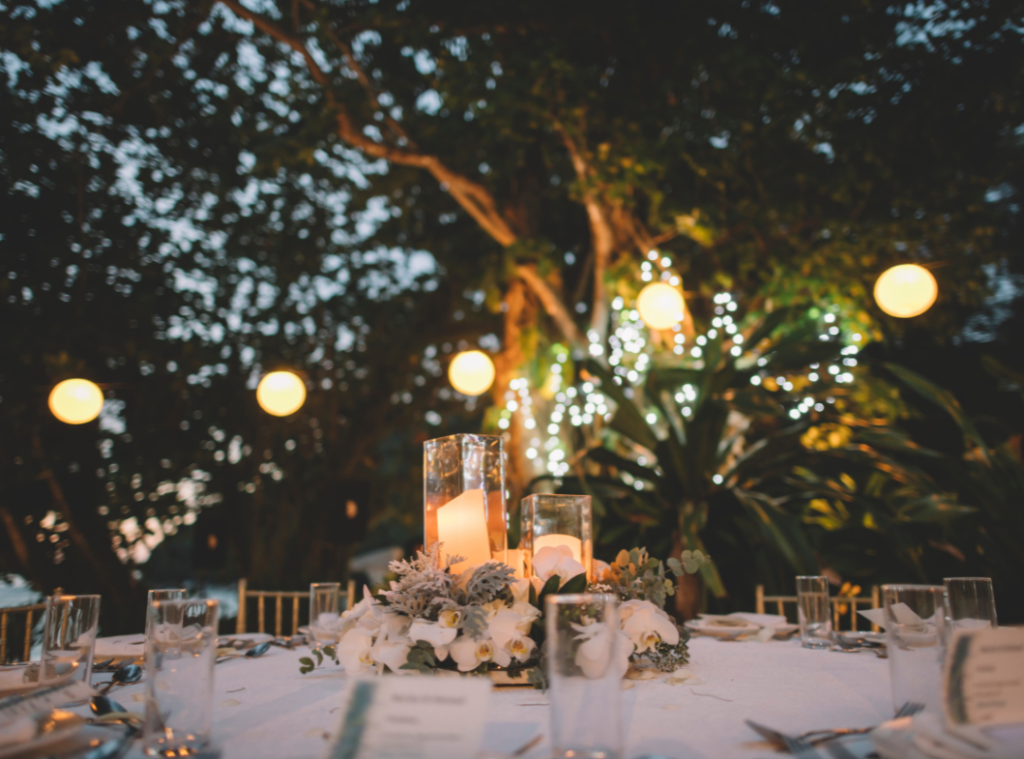
Capacity and Layout: Matching Wedding Venue Size with Your Guest List
Aligning Guest List Size with Wedding Venue Capacity
A fundamental aspect of choosing a wedding venue is ensuring it can comfortably accommodate your guest list. The size of the venue directly influences the comfort and flow of your wedding day.
A venue that’s too small for your guest list can feel cramped and overcrowded, while a venue that’s too large may lose the sense of intimacy and warmth you desire. It’s important to have a clear estimate of your guest count when venue hunting.
The Significance of Wedding Venue Layout
- Ceremony Space: Consider how the venue accommodates your ceremony (if needed). Is there enough space for seating, an aisle, and the altar? The layout should facilitate a clear view for guests and a seamless flow for the procession.
- Reception Area: Assess the reception area for dining and entertainment. Ensure there’s adequate space for tables, catering setup, and any additional elements like a photo booth or guest book station.
- Dance Floor and Entertainment: A critical component of many weddings is the dance floor. The venue should have a designated space for dancing and entertainment that is accessible and visible to all guests.
Versatility and Adaptability of the Wedding Venue
- Adaptable Spaces: Some venues offer versatile spaces that can be transformed or adjusted to suit different parts of your wedding. For example, a space that hosts the ceremony might later be converted into a dance floor.
- Flow Between Areas: Consider how guests will move between different areas of the venue. Is there a natural and comfortable flow from the ceremony to the cocktail hour to the reception? Efficient movement contributes significantly to the overall guest experience.
Choosing a venue with the right capacity and layout is crucial for the comfort and enjoyment of your guests. It’s about finding a balance between space, functionality, and the overall aesthetic of your wedding day. By carefully considering these elements, you can ensure that your chosen venue not only accommodates your guests but also enhances the experience of each part of your celebration.
Location: Choosing an Accessible and Convenient Wedding Venue
The Importance of Venue Location
The location of your wedding venue plays a pivotal role in the overall experience for you and your guests. A well-chosen location not only sets the scene for your wedding but also influences the logistics and accessibility for everyone involved.
- Accessibility for Guests: Consider how easy it is for guests to get to the venue. Is it conveniently located near major roads or public transportation? Accessibility is key, especially if many guests are traveling from out of town.
Considerations for Out-of-Town Guests
- Accommodation Options: If you have guests coming from afar, the proximity of the venue to hotels or other accommodations is crucial. Look for venues that are either close to lodging options or offer on-site accommodations.
- Transportation Logistics: Think about the transportation needs of your guests. Are there services like shuttles or public transportation available? For remote or secluded venues, consider arranging transportation to ensure guests can arrive and depart safely and conveniently.
Venue Location and Guest Experience
- Exploring Local Amenities: The venue’s location can also offer additional perks for guests, such as proximity to tourist attractions, restaurants, or entertainment options. This can be particularly appealing for guests making a weekend out of your wedding.
- Scenic Advantages: A venue’s geographical location can add to the aesthetic appeal of your wedding. Whether it’s a beachfront view, a picturesque countryside, or an urban skyline, the setting can enhance the atmosphere and provide stunning backdrops for photos.
Making a Practical Choice
When selecting the location of your wedding venue, balance the scenic and thematic elements with the practical aspects of accessibility and guest convenience. A well-located venue not only adds to the charm and ambiance of your wedding day but also ensures a smooth and enjoyable experience for everyone attending.
Facilities and Amenities: Essential Features of a Wedding Venue
Key Amenities to Consider
When choosing a wedding venue, it’s important to consider the facilities and amenities available. These features can significantly impact the comfort and convenience of your wedding day.
- Bridal Suite: A bridal suite or a private room for the wedding party is a valuable space for preparations and provides a quiet retreat during the festivities.
- Parking: Adequate parking is a must-have, especially for venues located in busy or remote areas. Ensure there’s enough space for your guests’ vehicles.
- Audio Equipment: Good quality audio equipment is essential for the ceremony and reception. Check if the venue provides sound systems, microphones, and speakers, or if you’ll need to arrange these separately.
Special Accommodations and Services
- Unique Offerings: Some venues offer special services or accommodations that can enhance your wedding experience. These might include on-site coordinators, tents, decorative items, or special lighting.
- Customization Options: Inquire about the flexibility to customize the space according to your theme and requirements. Some venues may offer various setups and layouts to suit different parts of your wedding.
Availability of Essentials
- Restroom Facilities: Ensure the venue has adequate and accessible restroom facilities for your guest count. Check their condition and consider the need for additional portable restrooms for larger outdoor events.
- Kitchen Area: If your catering needs require a kitchen, verify the availability and suitability of the venue’s kitchen facilities. This is crucial for both catering efficiency and food quality.
Furniture and Equipment
- Chairs and Tables: Confirm the availability and adequacy of essential furniture like chairs and tables. Ensure they are in good condition and suitable for your wedding’s style and guest count.
- Additional Items: Some venues may provide additional items like linens, centerpieces, or staging. Knowing what’s included can help you plan and potentially reduce the need for external rentals.
The right facilities and amenities can make a significant difference in the smooth running of your wedding day. By thoroughly evaluating what each venue offers, you can ensure that your chosen location not only meets your aesthetic expectations but also provides the practical support and comfort needed for a successful event.
Restrictions and Rules: Navigating Wedding Venue Limitations
Understanding Venue Restrictions
When selecting your wedding venue, it’s crucial to be aware of any restrictions or rules that could impact your plans. Being informed about these limitations upfront can help you avoid any surprises or last-minute adjustments.
- Noise Restrictions: Inquire about noise level limitations, especially for evening or outdoor events. Some venues have strict cutoff times for music, which could affect your entertainment plans.
- Decor Limitations: Check what types of decorations are allowed. Certain venues may have restrictions on hanging items, the use of candles, or other specific decor elements due to safety or preservation concerns.
Impact on Wedding Plans
- Adapting to Rules: Understanding the venue’s rules will help you plan accordingly. For instance, noise restrictions might influence your choice of band or DJ, or decor limitations might steer your decoration choices.
- Creative Solutions: Restrictions don’t always have to be a setback. Sometimes, they can inspire creative solutions that make your wedding unique. For example, noise limitations could lead to an intimate acoustic set rather than a loud band.
Informed Decision-Making
- Clarify Early On: To avoid any misunderstandings, discuss all restrictions with the venue representative in detail. Get clarity on what is and isn’t permissible.
- Assess Compatibility: Consider how these rules align with your vision for the day. If certain restrictions are too limiting, it might be worth looking at other venue options that can accommodate your needs more flexibly.
Being aware of and understanding the rules and restrictions of a wedding venue is essential in the wedding planning process. It ensures that your wedding aligns with the venue’s guidelines and helps in creating a harmonious and stress-free celebration. By considering these factors early in your planning, you can choose a venue that complements rather than compromises your wedding day vision.
Weather Considerations: Preparing for the Unexpected
Planning for Weather Contingencies
Weather can be unpredictable, and it’s crucial to have a plan for dealing with unexpected changes, especially if you’re considering an outdoor venue for your wedding.
- Understanding Local Weather Patterns: Research the typical weather conditions for your chosen location and time of year. This will help you anticipate potential weather scenarios and plan accordingly.
- Outdoor Venue Precautions: If your heart is set on an outdoor wedding, consider options like marquees, tents, or canopies that can protect against rain or excessive sunlight. Also, think about heating or cooling options, depending on the season.
The Importance of a Backup Plan
- Indoor Alternatives: Always have a backup plan in case of adverse weather. Check if your outdoor venue offers an indoor space that can be used if needed. If not, you may need to consider renting an alternative indoor location.
- Communication with Vendors: Ensure your vendors are aware of and prepared for potential weather changes. Caterers, florists, and decorators should be able to adapt their setups to suit different environments.
Flexibility and Adaptability
- Adaptable Decor and Layout: Choose decorations and a layout that can be easily moved or modified. Flexibility in your planning can make a swift transition to your backup location smoother and less stressful.
- Informing Guests: Keep your guests informed about potential weather changes and your contingency plans. This could be through your wedding website, social media, or on the invitation if the weather is known to be particularly unpredictable.
Weather considerations are a crucial aspect of wedding planning, particularly for outdoor events. By being prepared and having a robust contingency plan, you can ensure that your wedding day remains beautiful and enjoyable, regardless of what Mother Nature has in store. This foresight not only brings peace of mind but also ensures a seamless and memorable celebration for you and your guests.
📌 Save This For Later ↓
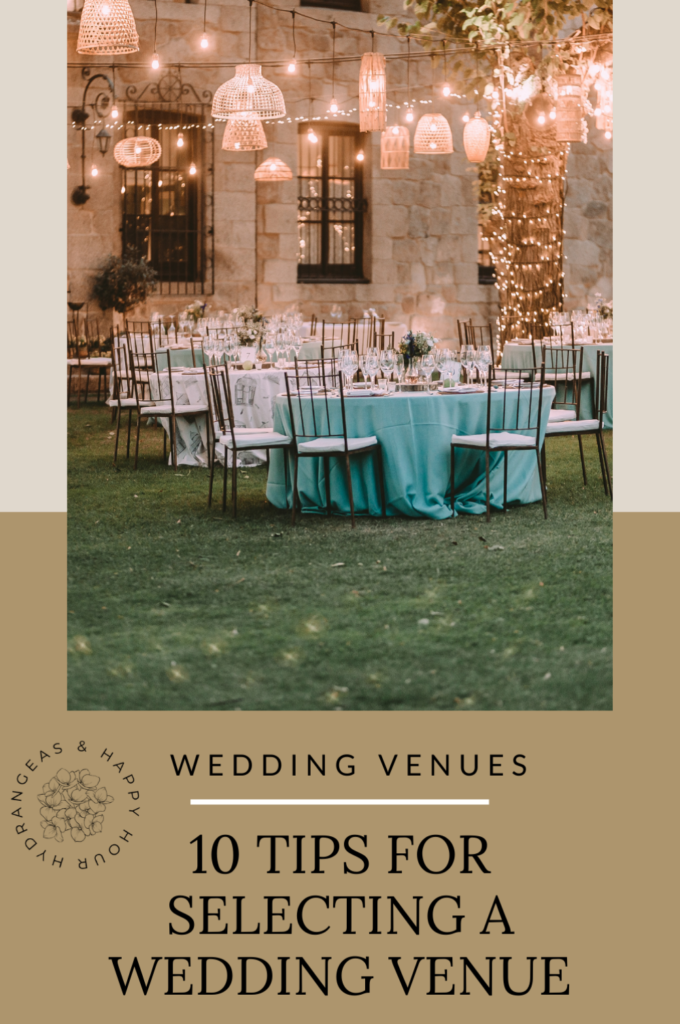
Catering and Alcohol Policies: Understanding Your Options and Obligations
Choosing Between In-House Catering and External Caterers
The choice of catering can have a significant impact on your wedding, both in terms of taste and budget.
- In-House Catering: Some venues offer their own in-house catering services. This option can be convenient as it ensures a seamless integration of services. However, it’s important to taste test their offerings and discuss menu flexibility to ensure it aligns with your preferences.
- External Caterers: Other venues allow you to bring in external caterers. This choice offers more control over the menu and the style of food served. If you opt for an external caterer, confirm any logistical requirements or limitations the venue may have.
Navigating Alcohol Policies and Corkage Fees
- Venue’s Alcohol Policy: Each venue will have its own policy regarding alcohol. Some venues might require you to purchase their alcohol, while others might allow you to bring your own.
- Understanding Corkage Fees: If a venue allows you to bring your own alcohol, they may charge a corkage fee. This is a per-bottle fee for serving alcohol that you supply. Be sure to factor this cost into your budget if you’re considering supplying your own alcohol.
Assessing Cost and Convenience
- Cost Comparison: When evaluating catering and alcohol options, consider the overall cost implications of each choice. In-house services might seem more expensive initially, but they often come with added conveniences and reduced logistical challenges.
- Coordination and Communication: Effective communication with your venue and caterers is crucial. Ensure that everyone is clear on roles, responsibilities, and timing to avoid any day-of confusion or mishaps.
The decisions regarding catering and alcohol at your wedding venue play a crucial role in the overall experience of your guests. Whether you choose in-house services or opt for external caterers, understanding and navigating the venue’s policies and fees is key. By carefully considering these aspects, you can make choices that align with your taste, style, and budget, ensuring a delightful culinary experience on your wedding day.
Reviews and Recommendations: The Value of First-Hand Experiences
The Power of Reviews in Wedding Venue Selection
Gathering insights from others who have already experienced what you’re considering can be invaluable in making an informed decision about your wedding venue.
- Reading Online Reviews: Start by checking online reviews of potential venues. Websites and forums dedicated to wedding planning are great resources. Pay attention to comments about the quality of service, flexibility, and the overall experience of dealing with the venue.
- Consistency in Feedback: Look for consistent themes in reviews. While every event is unique, recurring praises or complaints can give you a good sense of what to expect.
Seeking Personal Recommendations
- Word-of-Mouth Insights: Personal recommendations from friends, family, or colleagues can be incredibly helpful. They provide honest feedback and details that might not be apparent online.
- Wedding Planners and Vendors: If you’re working with a wedding planner or other vendors, ask them for their opinions on venues. They can offer professional insights based on their experiences at different locations.
Visiting Venues and Speaking with Recent Clients
- Site Visits: Schedule visits to your shortlisted venues. This allows you to see the space, assess how well it aligns with your vision, and speak with the staff directly.
- Talking to Recent Clients: If possible, ask the venue for references from recent clients. Speaking to couples who have recently hosted their wedding at the venue can provide you with valuable insights into their experiences and any tips they might have.
Incorporating reviews and recommendations into your venue selection process provides a more comprehensive understanding of what you can expect. This research helps ensure that your chosen venue not only meets your aesthetic and practical needs but also has a proven track record of satisfied clients. By taking the time to gather and analyze these insights, you’re making a well-informed decision for a venue that will play a crucial role in your wedding day.
📌 Save This For Later ↓
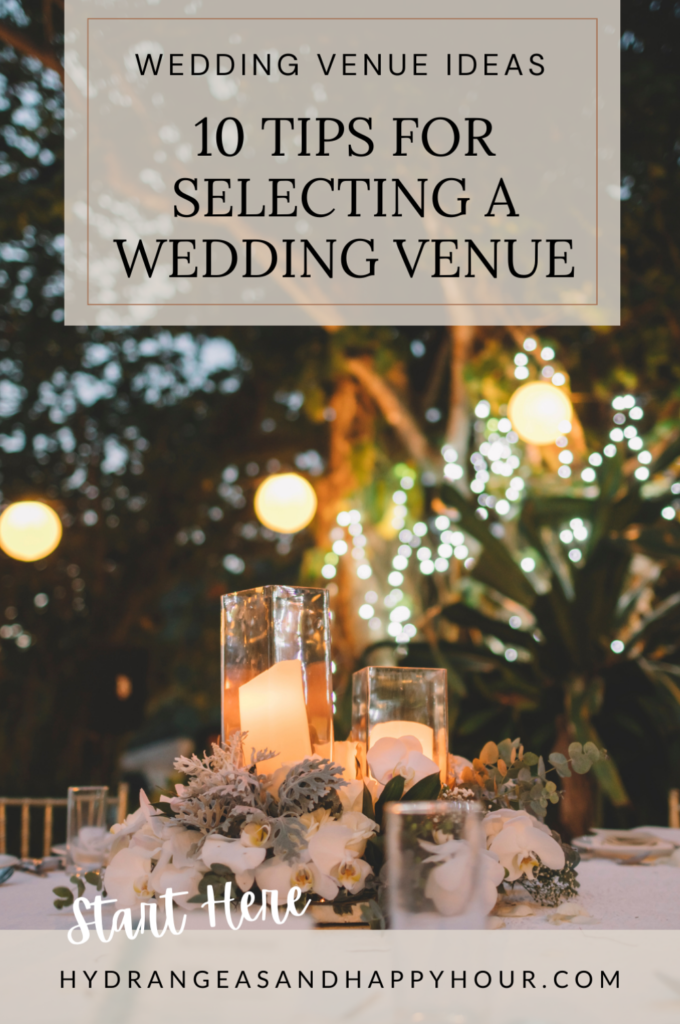
Conclusion: Selecting the Perfect Wedding Venue
In this guide, we’ve explored our top 10 essential tips for selecting a wedding venue, each playing a pivotal role in finding the perfect backdrop for your celebration. From setting a realistic budget and understanding the nuances of catering and alcohol policies to considering the venue’s capacity, layout, and location, these tips are designed to provide you with a comprehensive framework for making an informed decision.
Recap of Key Points:
- Budget: Keep your finances in check while searching for value.
- Location: Choose a convenient and accessible location for your guests.
- Capacity and Layout: Ensure the venue fits your guest list and desired layout.
- Style and Theme: Select a venue that aligns with your wedding’s aesthetic.
- Date and Availability: Be mindful of date flexibility and off-season benefits.
- Catering and Alcohol Policies: Understand the venue’s offerings and restrictions.
- Facilities and Amenities: Look for essential amenities that meet your needs.
- Restrictions and Rules: Be aware of the venue’s limitations.
- Weather Considerations: Plan for contingencies, especially for outdoor events.
- Reviews and Recommendations: Utilize the experiences of others for genuine insight.
Remember, choosing a wedding venue is more than just ticking boxes on a checklist; it’s about finding a space that resonates with your personal vision and meets your specific needs. Take your time to explore, ask questions, and envision your day in each space. Trust your instincts and choose a venue that feels right for you.
Your Thoughts and Experiences
We’d love to hear from you! If you have any questions, tips, or experiences to share about selecting a wedding venue, please feel free to leave a comment below. Your insights could be invaluable to couples embarking on this exciting journey.
Happy venue hunting! If you are just getting started on your wedding planning journey, head over to these blog posts: How to Plan a Wedding, The Wedding Planning Timeline and The Wedding Planning Checklist.


